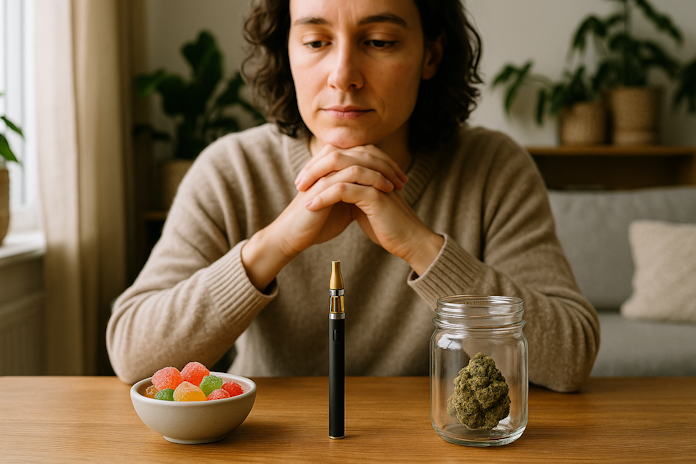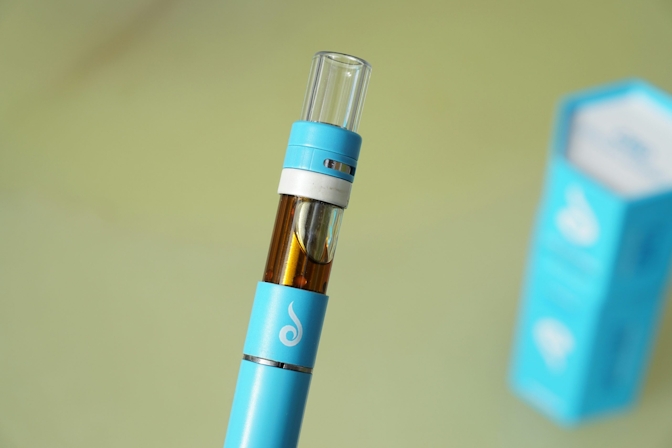
Herb
Delta-10 vs. HHC vs. THCP: Which Cannabinoid Is Right for You?
Which hemp-derived cannabinoid is right for your needs?
As hemp-derived cannabinoids gain popularity in the U.S. hemp market, consumers are discovering a growing selection of cannabis products containing cannabinoids beyond delta-9 THC and CBD. Minor cannabinoids like delta-10 THC, HHC, and THC-P can be found in vape pens, edibles, tinctures, and even sprayed onto hemp flower.
These cannabinoids are often made by converting CBD isolate from hemp biomass. Companies market these products as legal hemp-derived cannabinoids thanks to loopholes in the 2018 Farm Bill, which legalized hemp production and removed hemp (cannabis plants with <0.3% delta-9 THC) from the Controlled Substances Act.
But just because a product is derived from the hemp plant doesn’t make it natural or risk-free. Many of these cannabinoids are semi-synthetic, created using lab processes that alter CBD into new cannabinoids.
States are also enacting laws to restrict the sale of these intoxicating hemp-derived products, so it’s best to check your local laws before attempting to purchase any of these products.
Understanding the effects of these intoxicating compounds and their potency and safety is important, especially if you’re trying to decide which cannabinoid is best for your needs.
In this article, we break down the differences between delta-10 THC, HHC, and THC-P, along with comparing their strengths, potential benefits, and typical uses.
Understanding the Cannabinoid Spectrum

Herb
Delta-9-tetrahydrocannabinol (delta-9 THC) is the primary psychoactive compound in cannabis and is just one of over 100 cannabinoids found in the cannabis plant. Within hemp plants, CBD is the dominant cannabinoid and is non-intoxicating. Other cannabinoids, like CBC, CBG, CBN, delta-10 THC, HHC, and THC-P, are considered minor cannabinoids because they are present in small, trace amounts, although they still occur naturally.
Cannabinoids interact with the body’s endocannabinoid system (ECS), which is a network of receptors (mainly CB1 and CB2) that help regulate bodily processes like mood, memory, pain, and immune function. Each cannabinoid acts in different ways and on different cannabinoid receptors, some directly and some indirectly. Cannabinoids can also interact directly or indirectly with non-cannabinoid receptors in the brain, such as glutamate and serotonin. These interactions between cannabinoids and various receptors are responsible for producing the effects of cannabis products or hemp-derived products.
When choosing between delta-10 THC, HHC, and THCP, it’s important to consider the potential psychoactive effects and how they’re made and regulated, so that you can make an informed decision. You might technically be consuming a “legal” product, but that doesn’t mean it’s well-researched or contaminant-free.
What Is Delta-10 THC?

Elsa Olofsson
Delta-10 THC was first synthesized in 1984 by Morris Srebnik, Naphtali Lander, Aviva Breuer, and Raphael Mechoulam. Delta-10 THC is an isomer of delta-9 THC, having the same chemical formula but a different molecular structure. Their primary difference lies in the location of a double carbon bond, which significantly alters their effects on the body.
Delta-10 THC occurs naturally but is only found in trace amounts in the cannabis plant. Delta-10 THC products sold in the hemp market are semi-synthetic cannabinoids, created by chemically altering hemp-derived CBD isolate. This is done through a chemical process using heat and acid. However, this process may leave behind residual contaminants, and researchers are still identifying potential byproducts, so consumers should be cautious, especially when vaping or smoking these products.
Delta-10 Effects and Benefits
Research on delta-10 THC is limited, but anecdotal evidence suggests that it produces a stimulating, uplifting, and creative high that’s much less potent than delta-9 THC. It binds weakly to CB1 receptors, which may explain why it is less intoxicating than delta-9 THC.
Users often compare the effects of delta-10 THC to sativa-like strains, being energizing, slightly euphoric, and suitable for daytime use.
Delta-8 vs. Delta-9 vs. Delta-10
When comparing the three cannabinoids, delta-8 vs delta-9 vs delta-10 THC, it’s important to understand that each is an isomer. This means they have the same chemical formula but different molecular structures. The main difference lies in the position of their double bond along their carbon chain. This structure determines the binding efficacy of the cannabinoid and influences its psychoactive effects.
Here’s how they differ:
- Delta-8 THC: Reported as being delta-9 THC’s milder, “nicer younger sibling,” delta-8 THC offers a gentler high with reduced anxiety and paranoia. It is a popular cannabinoid among users seeking relaxation without the intensity of delta-9 THC.
- Delta-9 THC: This is the most potent and widely studied THC compound, known for its strong intoxicating effects. The primary compound responsible for the classic cannabis high.
- Delta-10 THC: With mild psychoactive effects, delta-10 THC is often associated with creative and energizing effects.
What Is HHC?

Elsa Olofsson
Hexahydrocannabinol (HHC) or HXC is a hydrogenated form of delta-9 THC. It was first discovered in the 1940s but recently gained popularity as a federally legal alternative to delta-9 THC. HHC is created by adding hydrogen atoms to delta-9 THC in a process known as hydrogenation, similar to how vegetable oil is converted into margarine. While HHC is not an isomer of delta-9 THC, it is a chemically modified form of it.
HHC Effects and Experience
Animal studies show that HHC behaves similarly to THC in the body. It appears to interact with CB1 receptors, producing some of the same psychoactive effects. However, the cannabinoid is produced as two isomers: (9R)-HHC and (9S)-HHC. Only (9R)-HHC binds effectively to CB1 receptors and produces noticeable effects. This may cause inconsistent feedback from consumers getting HHC products with (9S)-HHC, rather than (9R)-HHC.
Some of the most common user-reported effects include:
- Mild euphoria
- Appetite stimulation
- Sleep support
- Pain and nausea relief
That said, there’s no human clinical research on HHC yet. While early results from animal studies suggest HHC may offer pain relief, and anecdotal evidence suggests that it may feel similar to THC, its therapeutic potential remains largely unexplored.
HHC vs. THC: Key Differences
HHC is a hydrogenated form of delta-9 THC, meaning it’s structurally similar to delta-9 THC, but is chemically altered by adding hydrogen atoms. This small change gives HHC a longer shelf life and more resistance to heat and UV exposure, which is why some brands market it as a more stable alternative to THC.
However, when it comes to effects, HHC has less potent psychoactive properties compared to THC.
When comparing HHC vs THC, HHC is considered to have a lower potency than delta-9 THC. Animal studies suggest that it may provide pain relief and mild psychoactive effects. However, human research on the effects of HHC is nonexistent, so what we do know comes from consumer reports. Consumers often describe the high as relaxing, euphoric, and slightly less intense than traditional THC.
What Is THCP?

Elsa Olofsson
THCP (tetrahydrocannabiphorol) is a cannabinoid discovered in 2019. So, what exactly is THCP? THCP has a similar molecular structure to delta-9 THC but with a longer alkyl side chain, allowing it to bind up to 33 times more effectively to CB1 receptors.
While THCP is a minor cannabinoid found in cannabis and hemp plants, it is found in extremely small trace amounts. Because of this, THCP products sold today are synthetic, created by converting other cannabinoids like CBD.
THCP Effects and Potency
THCP induces effects very similar to THC, including:
- Intense euphoria
- Heightened sensory perception
- Deep relaxation
- Altered perception of time
Due to its strong binding affinity, THCP may have a stronger psychoactive effect than delta-9 THC, but how that translates to humans is still unknown. Users often describe it as a heavily sedating, body-melting experience, even in small amounts.
THCP vs. THC: Understanding the Difference
Although THCP and THC look nearly identical at a molecular level, they interact with the body in different ways. So, what are the main differences between THCP vs THC?
The primary difference is the length of the carbon chain of each cannabinoid. THCP has a 7-carbon alkyl side chain, and THC has a 5-carbon alkyl side chain. The longer carbon side chain allows it to bind more effectively to CB1 receptors in the brain, which are responsible for creating the psychoactive effects.
Early studies suggest that THCP could bind up to 33 times more effectively than delta-9 THC, potentially making it much more potent. Studies on animals have shown that synthetic THCP may produce stronger versions of THC effects, like sedation, pain relief, and reduced movement. However, there’s only one published study on THCP, so its safety profile, side effects, and potential benefits as a new cannabinoid are still mostly unknown.
In short, THCP may offer more potent effects compared to THC. Still, until more research is done on its safety, particularly when inhaled, consumers should steer clear of this powerful new cannabinoid.
Comparing Delta-10, HHC, and THCP: Which To Choose?

Elsa Olofsson
When it comes to cannabinoids, the best option depends on your personal goals, tolerance, and the kind of experience you’re seeking. So, what are the main differences between delta-10 vs. HHC vs. THCP products?
Effects Comparison
- Delta-10 THC: Consumers report that it is less intoxicating than delta-8 or delta-9 THC, having uplifting and creative effects.
- HHC: Said to be mildly euphoric and relaxing, some consumers also say it helps with appetite, pain, and sleep.
- THCP: Extremely potent and binds to CB1 receptors up to 33x more than delta-9 THC (though that doesn’t mean it’s 33x stronger). Often described as heavy-hitting and sedating.
Best Uses and Occasions
- Delta-10 THC: Great for people looking for increased focus, creativity, and productivity without the fog.
- HHC: A go-to for users who want a gentle THC alternative, HHC is popular for unwinding without feeling overwhelmed at the end of the day.
- THCP: Best saved for experienced consumers, THCP may be helpful for intense relaxation, deeper sleep, or high-tolerance users.
Consumption Methods Comparison
All three cannabinoids are available in vape pens, edibles, tinctures, and concentrates. Delta-10 and HHC can also be sprayed on hemp flowers. However, using these cannabinoids in smokable or vapeable forms is not recommended. These hemp-based products are unregulated and may release unknown and harmful byproducts when heated.
FAQs

Herb
Is Delta-10 stronger than delta-8?
Delta-10 is said to produce a milder high than delta-8. Some delta-10 users describe the psychoactive effects as more energizing and less sedating than delta-8.
Is HHC stronger than delta-8?
For some users, HHC may feel slightly stronger or have longer-lasting effects than delta-8 THC, but the effects of HHC vary depending on the specific isomer present and product purity.
Is THCP stronger than THC?
Yes, THCP is considered to be much stronger than traditional THC due to its increased binding affinity for CB1 receptors.
Herb Recommended Products:
READ MORE










